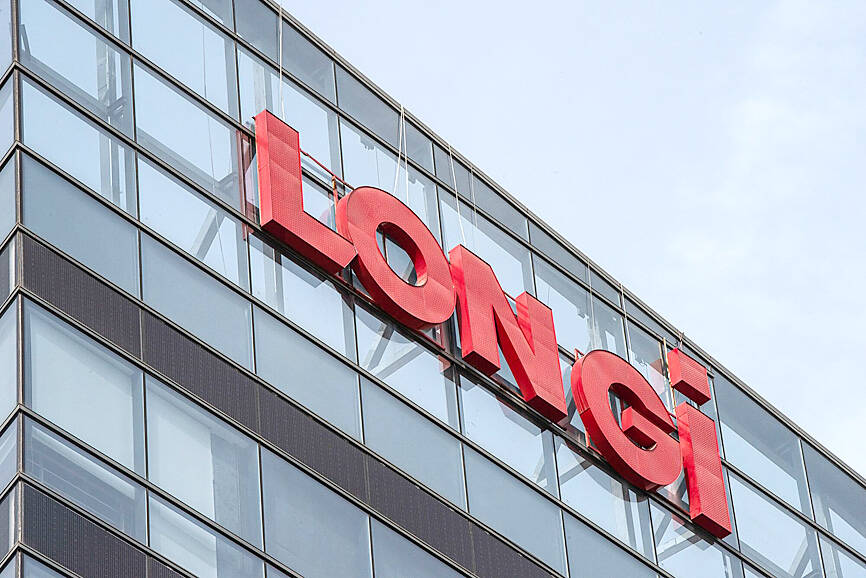China’s Longi Green Technology Energy Co (隆基綠能) — the world’s largest solar manufacturer — is cutting almost one-third of its workforce as it tries to slash costs in an industry struggling with overcapacity and fierce competition, according to people familiar with the matter.
Longi plans to trim as much as 30 percent of its staff that last year totaled about 80,000 people at its peak, several people familiar with the situation, including some briefed by senior management, told Bloomberg.
The move signals an acceleration of job cuts that Longi began in November last year, when it started laying off thousands of people who were mostly management trainees and factory hires, a reaction to years of breakneck expansion across the global solar industry. It isn’t clear how many employees had been dismissed before this latest decision.

Photo: Bloomberg
Xi’an-based Longi isn’t alone: China’s solar industry dominates global manufacturing but has suffered from layoffs and suspended investment plans in recent months. Manufacturers have been forced to sell at or below production costs after prices for solar panels fell to record lows last year. The result is that an industry seen as crucial to the global energy transition is struggling with excessive capacity, consolidation and the possibility of bankruptcies.
Fierce competition has also forced many companies that make wafers — a solar panel precursor that is wired into cells and assembled into modules — to cut production. Longi, a leading wafer producer, had to significantly cut prices last year.
Staff at Longi have seen previous efforts to cut costs fall short, including the cancelation of free afternoon tea, shrinking budgets for business trips and being told to only print in black-and-white unless approved to do otherwise by supervisors, the people said. Longi’s Shanghai office also stopped offering free coffee, two of the people said.
Amid rising internal concerns about job losses by rank-and-file workers, the company late last year disabled an internal function where employees could see the total number of staff, some of the people said.
Beyond the overcapacity and competition issues, there have been other headaches for Longi and the industry: some Chinese manufacturers have had their exports to the US held up over alleged forced labor abuses in China’s Xinjiang region, accusations which Beijing has repeatedly denied. Longi saw its American joint venture in Ohio, which it built with a local partner, face pushback as political tensions between Beijing and Washington rose.
For Longi, the financial pressures sent its net income plunging 44 percent to 2.52 billion yuan (US$350 million) in the third quarter of last year. The company’s shares have fallen about 70 percent from their peak in 2021.

Taiwanese suppliers to Taiwan Semiconductor Manufacturing Co. (TSMC, 台積電) are expected to follow the contract chipmaker’s step to invest in the US, but their relocation may be seven to eight years away, Minister of Economic Affairs J.W. Kuo (郭智輝) said yesterday. When asked by opposition Chinese Nationalist Party (KMT) Legislator Niu Hsu-ting (牛煦庭) in the legislature about growing concerns that TSMC’s huge investments in the US will prompt its suppliers to follow suit, Kuo said based on the chipmaker’s current limited production volume, it is unlikely to lead its supply chain to go there for now. “Unless TSMC completes its planned six

Intel Corp has named Tasha Chuang (莊蓓瑜) to lead Intel Taiwan in a bid to reinforce relations between the company and its Taiwanese partners. The appointment of Chuang as general manager for Intel Taiwan takes effect on Thursday, the firm said in a statement yesterday. Chuang is to lead her team in Taiwan to pursue product development and sales growth in an effort to reinforce the company’s ties with its partners and clients, Intel said. Chuang was previously in charge of managing Intel’s ties with leading Taiwanese PC brand Asustek Computer Inc (華碩), which included helping Asustek strengthen its global businesses, the company

Power supply and electronic components maker Delta Electronics Inc (台達電) yesterday said second-quarter revenue is expected to surpass the first quarter, which rose 30 percent year-on-year to NT$118.92 billion (US$3.71 billion). Revenue this quarter is likely to grow, as US clients have front-loaded orders ahead of US President Donald Trump’s planned tariffs on Taiwanese goods, Delta chairman Ping Cheng (鄭平) said at an earnings conference in Taipei, referring to the 90-day pause in tariff implementation Trump announced on April 9. While situations in the third and fourth quarters remain unclear, “We will not halt our long-term deployments and do not plan to

The New Taiwan dollar and Taiwanese stocks surged on signs that trade tensions between the world’s top two economies might start easing and as US tech earnings boosted the outlook of the nation’s semiconductor exports. The NT dollar strengthened as much as 3.8 percent versus the US dollar to 30.815, the biggest intraday gain since January 2011, closing at NT$31.064. The benchmark TAIEX jumped 2.73 percent to outperform the region’s equity gauges. Outlook for global trade improved after China said it is assessing possible trade talks with the US, providing a boost for the nation’s currency and shares. As the NT dollar